新世纪Unit 4 Lesson 1 Snow White and the Seven Dwarfs知识点
- 格式:doc
- 大小:41.50 KB
- 文档页数:4

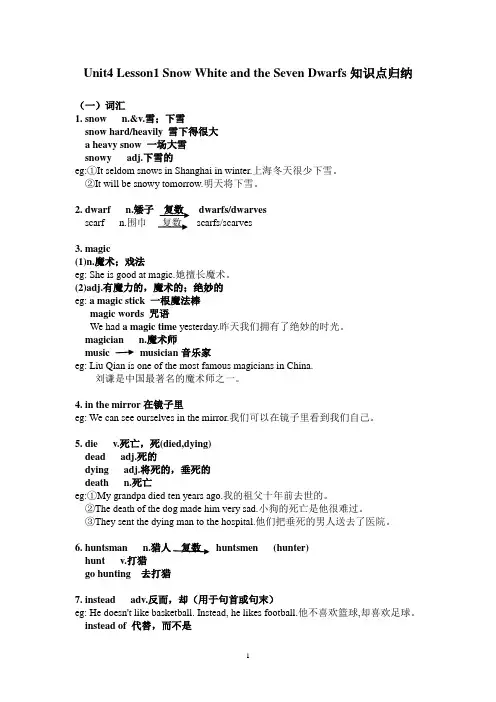
Unit4 Lesson1 Snow White and the Seven Dwarfs知识点归纳(一)词汇1. snow n.&v.雪;下雪snow hard/heavily 雪下得很大a heavy snow 一场大雪snowy adj.下雪的eg:①It seldom snows in Shanghai in winter.上海冬天很少下雪。
②It will be snowy tomorrow.明天将下雪。
2. dwarf n.矮子复数dwarfs/dwarvesscarf n.围巾复数scarfs/scarves3. magic(1)n.魔术;戏法eg: She is good at magic.她擅长魔术。
(2)adj.有魔力的,魔术的;绝妙的eg: a magic stick 一根魔法棒magic words 咒语We had a magic time yesterday.昨天我们拥有了绝妙的时光。
magician n.魔术师music musician音乐家eg: Liu Qian is one of the most famous magicians in China.刘谦是中国最著名的魔术师之一。
4. in the mirror在镜子里eg: We can see ourselves in the mirror.我们可以在镜子里看到我们自己。
5. die v.死亡,死(died,dying)dead adj.死的dying adj.将死的,垂死的death n.死亡eg:①My grandpa died ten years ago.我的祖父十年前去世的。
②The death of the dog made him very sad.小狗的死亡是他很难过。
③They sent the dying man to the hospital.他们把垂死的男人送去了医院。
6. huntsman n.猎人复数huntsmen (hunter)hunt v.打猎go hunting 去打猎7. instead adv.反而,却(用于句首或句末)eg: He doesn't like basketball. Instead, he likes football.他不喜欢篮球,却喜欢足球。
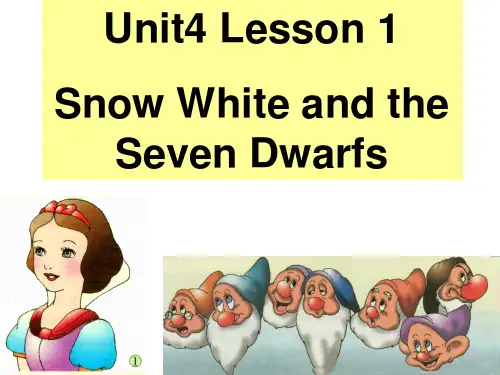
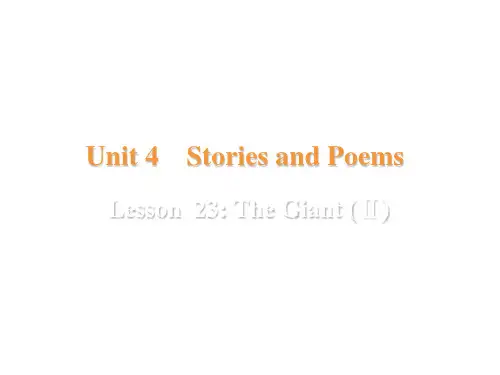
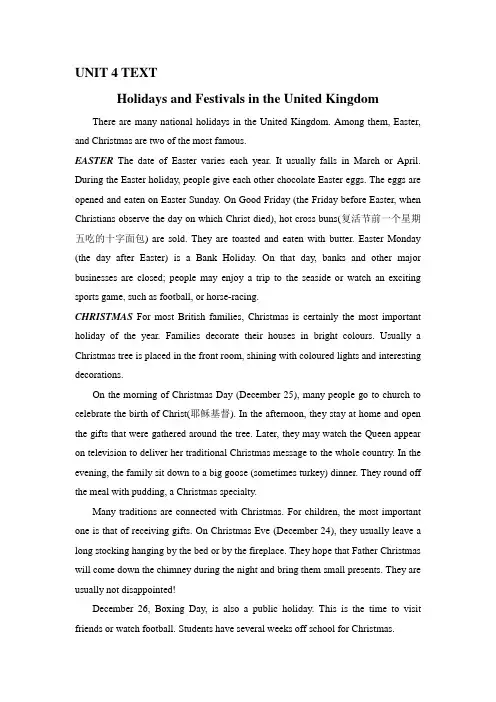
UNIT 4 TEXTHolidays and Festivals in the United Kingdom There are many national holidays in the United Kingdom. Among them, Easter, and Christmas are two of the most famous.EASTER The date of Easter varies each year. It usually falls in March or April. During the Easter holiday, people give each other chocolate Easter eggs. The eggs are opened and eaten on Easter Sunday. On Good Friday (the Friday before Easter, when Christians observe the day on which Christ died), hot cross buns(复活节前一个星期五吃的十字面包) are sold. They are toasted and eaten with butter. Easter Monday (the day after Easter) is a Bank Holiday. On that day, banks and other major businesses are closed; people may enjoy a trip to the seaside or watch an exciting sports game, such as football, or horse-racing.CHRISTMAS For most British families, Christmas is certainly the most important holiday of the year. Families decorate their houses in bright colours. Usually a Christmas tree is placed in the front room, shining with coloured lights and interesting decorations.On the morning of Christmas Day (December 25), many people go to church to celebrate the birth of Christ(耶稣基督). In the afternoon, they stay at home and open the gifts that were gathered around the tree. Later, they may watch the Queen appear on television to deliver her traditional Christmas message to the whole country. In the evening, the family sit down to a big goose (sometimes turkey) dinner. They round off the meal with pudding, a Christmas specialty.Many traditions are connected with Christmas. For children, the most important one is that of receiving gifts. On Christmas Eve (December 24), they usually leave a long stocking hanging by the bed or by the fireplace. They hope that Father Christmas will come down the chimney during the night and bring them small presents. They are usually not disappointed!December 26, Boxing Day, is also a public holiday. This is the time to visit friends or watch football. Students have several weeks off school for Christmas.。
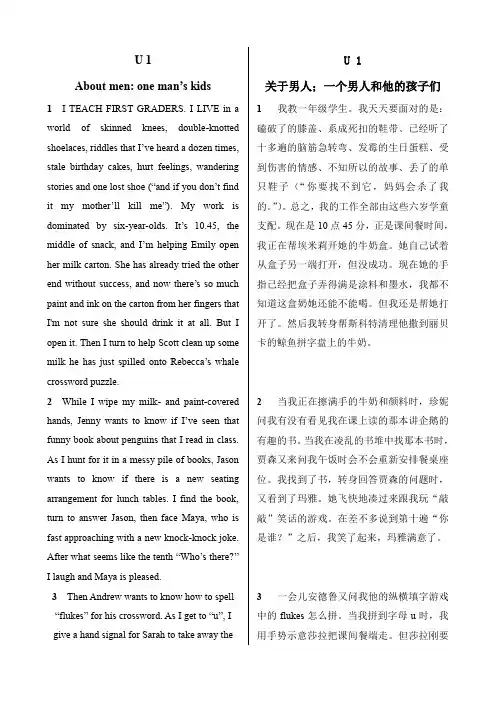
U 1About men: one man’s kids1 I TEACH FIRST GRADERS. I LIVE in a world of skinned knees, double-knotted shoelaces, riddles that I’ve heard a dozen times, stale birthday cakes, hurt feelings, wandering stories and one lost shoe (“and if you don’t find it my mother’ll kill me”). My work is dominated by six-year-olds. It’s 10.45, the middle of snack, and I’m helping Emily open her milk carton. She has already tried the other end without success, and now there’s so much paint and ink on the carton from her fingers that I'm not sure she should drink it at all. But I open it. Then I turn to help Scott clean up some milk he has just spilled onto Rebecca’s whale crossword puzzle.2 While I wipe my milk- and paint-covered hands, Jenny wants to know if I’ve seen that funny book about penguins that I read in class. As I hunt for it in a messy pile of books, Jason wants to know if there is a new seating arrangement for lunch tables. I find the book, turn to answer Jason, then face Maya, who is fast approaching with a new knock-knock joke. After what seems like the tenth “Who’s there?’’ I laugh and Maya is pleased.3Then Andrew wants to know how to spell “flukes” for his crossword. As I get to “u”, I give a hand signal for Sarah to take away theU 1关于男人;一个男人和他的孩子们1我教一年级学生。
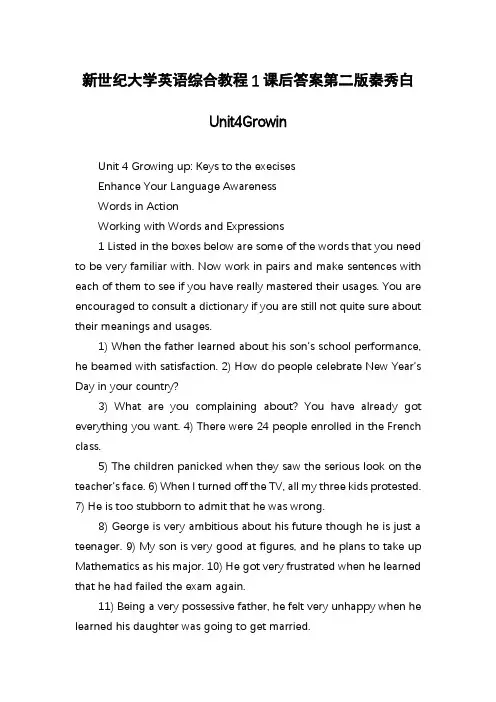
新世纪大学英语综合教程1课后答案第二版秦秀白Unit4GrowinUnit 4 Growing up: Keys to the execisesEnhance Your Language AwarenessWords in ActionWorking with Words and Expressions1 Listed in the boxes below are some of the words that you need to be very familiar with. Now work in pairs and make sentences with each of them to see if you have really mastered their usages. You are encouraged to consult a dictionary if you are still not quite sure about their meanings and usages.1) When the father learned about his son’s school performance, he beamed with satisfaction. 2) How do people celebrate New Year’s Day in your country?3) What are you complaining about? You have already got everything you want. 4) There were 24 people enrolled in the French class.5) The children panicked when they saw the serious look on the teacher’s face. 6) When I turned off the TV, all my three kids protested.7) He is too stubborn to admit that he was wrong.8) George is very ambitious about his future though he is just a teenager. 9) My son is very good at figures, and he plans to take up Mathematics as his major. 10) He got very frustrated when he learned that he had failed the exam again.11) Being a very possessive father, he felt very unhappy when he learned his daughter was going to get married.12) How can you keep your children at home for the whole week? Of course, they will get restless.2 In the box below are some of the words you have learned in this unit. Complete the following sentences with them. Change the form where necessary.1) She finds herself in conflict with her parents over her future career.2) The two parties finally overcame their differences on the matter of interest rate (利率).3) Some strange customs have survived from earlier times.4) Please let us know if you can attend the meeting scheduled (事先安排) for the coming Thursday.5) She frowned with displeasure as she was reading her son’s school report. 6) Students are likely to let their minds wander if the teacher’s lectures are dull and boring.7) I always feel so guilty about not visiting my parents more often, but I do have lots of things to cope with every day.8) The local farmers sustained heavy losses during the flood season.9) The next morning we all went out to survey the damage caused by the fire. 10) The sudden appearance of a tiger from the woods terrified us all. 11) International students are required to carry medical insurance as a condition of enrollment (注册).12) Adapting to a new culture is no easy task because there are lots of cultural differences to overcome.3 In the boxes below are some of the expressions you have learned in this unit. Do you understand their meanings? Do you know how to use them in the proper context? Now check for yourself by doing the blank-filling exercises. Change the form where necessary.1) The old man was sick of having arguments all the time with his wife. 2) “You really can’t imagine what I have gone through,” Mary said, chokingback her tears.3) Compared with growing up in primitive societies, growing up in today’s world is in some ways harder.4) When I first settled into teaching in this small town, I felt very awkward, for my neighbors wanted to know everything about me.5) The boys would give anything / the world to meet that football star. 6) Tom rushed into the room when Jane and I were in the midst of a conversation.7) It’s true t hat his father is a world-famous movie star, but Jack became famous in his own right .8) We didn’t plan it like that but it worked out very well.9) At first he found it extremely hard to fit in with his colleagues at the new company.10) When I was in my teens, I gradually grew apart from my parents, only to realize how wrong I was in my later years.11) I’m sorry to hear that you’re suffering from a severe cold. No wonder you did not turn up at the party yesterday.12) It is not a healthy habit staying up too late.13) I was annoyed with my mother’s tight control over me and ended up shouting at her one day.14) The boy was scared of his mother because she would always scold(责怪) him if he did anything wrong.15) Because of my carelessness, I soon found myself in trouble again and then I realized that what my mother had said was right.16) He is not a very responsible person. For instance , he promised to come to our meeting, but never even responded whenwe invited him.● Increasing Your Word Power1 The words listed in the following box can be used to describe either a teenager or a parent. Go over each word carefully and then choose the right word to complete each sentence.1) He is a very possessive father. He says “no” to all his daughter’s boyfriends. 2) A(n) over-protective parent usually weakens his / her child’s belief in his / her ability to solve his / her own problems.3) Are you a(n) frustrated parent whose teenager always makes angry scenes whe n you try to get him or her to “just DO something”?4) His possessive mother wants him to ring her 3 times a day at least to keep her informed of what he does at school.5) It is often the case that in a family one parent is usually slightly lenient /strict and the other is slightly strict / lenient .6) Teenagers are rather rebellious as they often prefer to be on their own and refuse to listen to their parents.7) Don’t blame him: he’s just a(n) frustrated teenager who feels that he is unable to find his position in life.8) Don’t blame him for not wanting to stay at home. He is just a restless teenager longing for adventure.9) She used to be a(n) stubborn teenager who thought that whatever she believed was correct.2 Match the verbs in the box with the nouns below so that they form correct collocations. If you are in doubt, consult a dictionary. Put the verbs in the space provided and each verb is to be used only once. Then write down six sentences of your own using the collocations.1) survey the damage 2) sustain dents 3) attend a meeting 4) terrify somebody 5) wrap presents 6) recall an eventWrite down your own sentences here.1) After surveying the damage, we concluded that it was caused by animals. 2) His car sustained dents when it hit the road block. 3) The teachers will attend our meeting this afternoon. 4) The stern expression on his face terrified me. 5) Please wrap the presents carefully.6) When he recalled what happened ten years ago, he stillc ouldn’t help feeling sorry.3 Did you notice the suffixes -ize, -ify in words such as realize, terrify in this unit? The suffixes -ize, -ify can be added to nouns or adjectives to form verbs. Now form verbs by adding -ize or -ify to the words given in the table and write down the Chinese meaning for each verb.Nouns / Adjectives SuffixesVerbsChinese Meanings beauty beautify 使美起来;美化just justify 证明…正当;证明…无罪modern modernize 使现代化popular popularize 使大众化;普及,推广pure purify 使纯净;提纯simple -ize/-ifysimplify 简化;使简易symbol symbolize 作为…的象征,标志test testify 作证,证明;表明theory theorize 使理论化;从理论上说明4 Complete each of the following sentences with a proper word you have thusformed.1) The procedures have been simplified so that users can operate the system easily.2) The flower baskets and paintings helped to beautify the church.3) The pursuit of good ends does not justify the employment of bad means. 4) He decided to testify on behalf of the accused man before the jury(陪审团). 5) It is much easier to theorize about a solution than to actually put it into practice.6) The government is making efforts to popularize solar energy industry in response to national energy shortage.7) Research has shown that certain green plants can purify indoor air and regulate humidity.8) Many people deeply sympathized with the victims of the disaster and donated whatever they could to help them out.9) In religion and art, an eagle stands for freedom and strength, while a dove symbolizes peace and purity.10) The company has made massive investments in modernizing its assembly line(生产线).Grammar in ContextTask 1: Discuss with a partner and explain whether the highlighted verbs below have different meanings when used transitively or intransitively.1) a. I survived my last years of high school until finally I turned eighteen. (Para. 9, Text A)b. Thousands of people were killed in the disaster, but he survived.a.: vt.;b.: vi., with the same meaning: “did not die”2) a. And so when str angers asked me if I was Doctor Eppley’s son,I replied emphatically, … (Para. 4, Text A)b. I wrote him a letter telling him that I would pay him a visit, and he replied that he would be glad to see me again. a.: vi. meaning “respond in words” b.: vt.meaning “write back”3) a. And I can manage quite well on my own. (Para. 4, Text A)b. He had been managing the business for six years before it made a profit. a.: vi. meaning “succeed in dealing with sth.” b.: vt. meaning “be in control or in charge of”4) a. I was sixteen years old and the neighbors still called me “Doctor Eppley’sson.” (Para. 3, Text A)b. I’ve got to call at the bank to get some cash.a.: vt. meaning “say or consider that (sb. or sth.) is (sth.)” b.: vi. meaning “pay a brief visit”Task 2: Read the sentences below and decide whether each one contains an error in the use of transitive or intransitive verbs. Put a tick (√) before the sentence that is correct. Put a cross (×) before the incorrect sentence and make c orrections in the space given below. ×1. The couple argued each other right after they got married and refused to make up.(argued with each other)×?2. The accident was happened right at this spot.(The accident happened …)×??3. Tommy went to the party and he really enjoyed.(enjoyed it)√??4. John really has green fingers. He grows a variety of beautiful flowersin his garden.√??5. Your mother is critically ill. She may not be able to survive this winter.?×?6. Th e boy did not like the new maid. He shouted her every time she tried to touch him.(shouted at)?√?7. Can you imagine that Jack called me a thief? ?√?8. It is quite late now; let me walk you to the bus stop. ClozeComplete the following passage with words chosen from this unit. The initial letter of each is given.When I was a child, I was really proud of having a father who was a well respecteddoctor. I beamed (1) whenever my teachers said that I was set tobecome an honorable (2) man like my father. However, all this changed when I grew into a teenager. I felt awkward (3) that everybody around me only remembered me as Dr. Song’s son. I protested (4) and told them that I would prefer to stand on my own two feet. However, my complaints (5) were never taken seriously and I continued to hear compliments (6) about me, which were really meant for my father. I then grew very stubborn (7) and even refused to call my father “Dad.” Although my father frowned (8) whenever I called him “Lao Song,” my attitude towards him, as I now recall (9), did not change until I had a car accident one day. I hit a young man’s car and panicked (10) as he threatened to beat me up when I told him I had no car insurance (11). When I got off my car and surveyed (12) t he damage, I could not help groaning (13). Out of fear, I told him “I’m Dr. Song’s son.” At this, a sign of recognition (14) lit up his face; he smiled and forgave me. What could have been a very difficult situation turned out to befine just because I was Dr. Song’s son. How thankful I felt towards my father. TranslationTranslate the following sentences into English, using the words and expressions given in brackets.1) 很多老师不赞同这种做法。
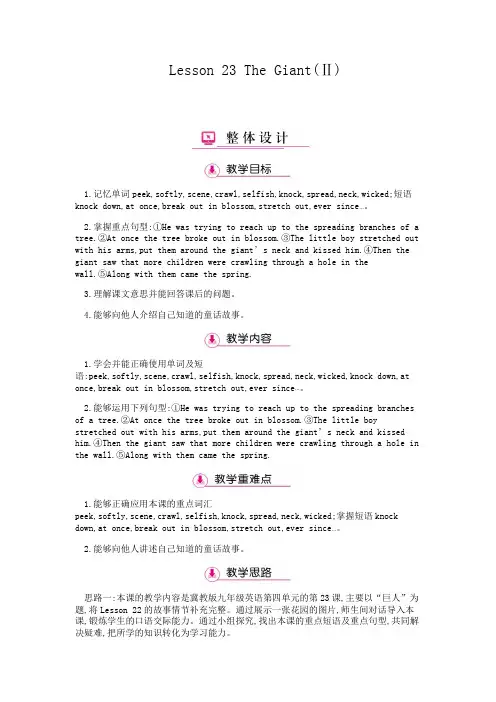
Lesson 23 The Giant(Ⅱ)1.记忆单词peek,softly,scene,crawl,selfish,knock,spread,neck,wicked;短语knock down,at once,break out in blossom,stretch out,ever since…。
2.掌握重点句型:①He was trying to reach up to the spreading branches of a tree.②At once the tree broke out in blossom.③The little boy stretched out with his arms,put them around the giant’s neck and kissed him.④Then the giant saw that more children were crawling through a hole in thewall.⑤Along with them came the spring.3.理解课文意思并能回答课后的问题。
4.能够向他人介绍自己知道的童话故事。
1.学会并能正确使用单词及短语:peek,softly,scene,crawl,selfish,knock,spread,neck,wicked,knock down,at once,break out in blossom,stretch out,ever since…。
2.能够运用下列句型:①He was trying to reach up to the spreading branches of a tree.②At once the tree broke out in blossom.③The little boy stretched out with his arms,put them around the giant’s neck and kissed him.④Then the giant saw that more children were crawling through a hole in the wall.⑤Along with them came the spring.1.能够正确应用本课的重点词汇peek,softly,scene,crawl,selfish,knock,spread,neck,wicked;掌握短语knock down,at once,break out in blossom,stretch out,ever since…。
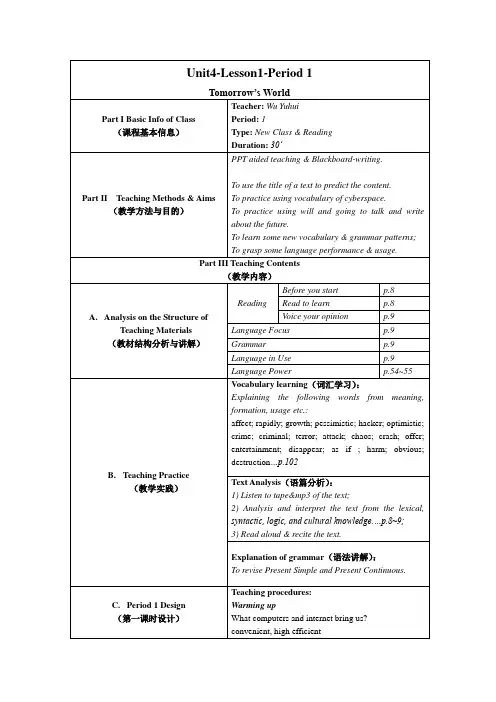
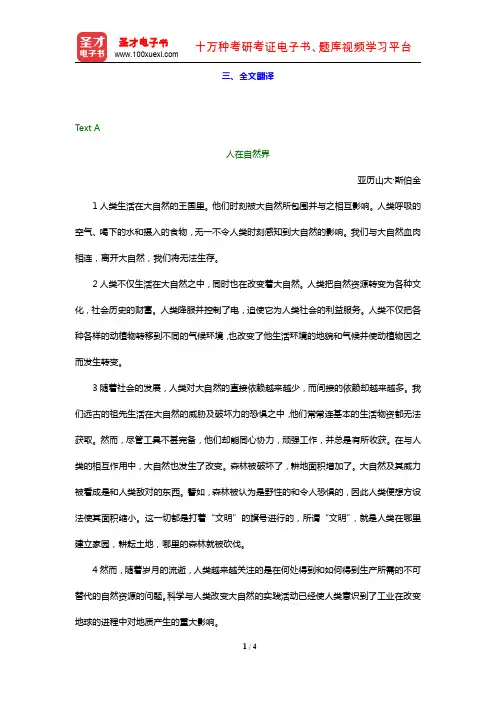
三、全文翻译Text A人在自然界亚历山大·斯伯金1人类生活在大自然的王国里。
他们时刻被大自然所包围并与之相互影响。
人类呼吸的空气、喝下的水和摄入的食物,无一不令人类时刻感知到大自然的影响。
我们与大自然血肉相连,离开大自然,我们将无法生存。
2人类不仅生活在大自然之中,同时也在改变着大自然。
人类把自然资源转变为各种文化,社会历史的财富。
人类降服并控制了电,迫使它为人类社会的利益服务。
人类不仅把各种各样的动植物转移到不同的气候环境,也改变了他生活环境的地貌和气候并使动植物因之而发生转变。
3随着社会的发展,人类对大自然的直接依赖越来越少,而间接的依赖却越来越多。
我们远古的祖先生活在大自然的威胁及破坏力的恐惧之中,他们常常连基本的生活物资都无法获取。
然而,尽管工具不甚完备,他们却能同心协力,顽强工作,并总是有所收获。
在与人类的相互作用中,大自然也发生了改变。
森林被破坏了,耕地面积增加了。
大自然及其威力被看成是和人类敌对的东西。
譬如,森林被认为是野性的和令人恐惧的,因此人类便想方设法使其面积缩小。
这一切都是打着“文明”的旗号进行的,所谓“文明”,就是人类在哪里建立家园,耕耘土地,哪里的森林就被砍伐。
4然而,随着岁月的流逝,人类越来越关注的是在何处得到和如何得到生产所需的不可替代的自然资源的问题。
科学与人类改变大自然的实践活动已经使人类意识到了工业在改变地球的进程中对地质产生的重大影响。
5目前,人与自然以及自然与社会整体之间过去存在的动态平衡,已呈现崩溃的迹象。
生物圈中所谓可替代资源的问题变得极为尖锐。
人类和社会的需求,即便是简单得像淡水一样的物质,也变得越来越难以满足。
清除工业废物的问题也变得日益复杂。
6现代技术的特征是生产和使用日益丰富的人工合成产品。
人们生产成千上万的人工合成材料。
人们越来越多地用尼龙和其他人造纤维把自己从头到脚地包裹起来,这些绚丽的织物显然对他们无益。
年轻人或许很少注意到这一点,他们更关注的是外表,而不是健康。
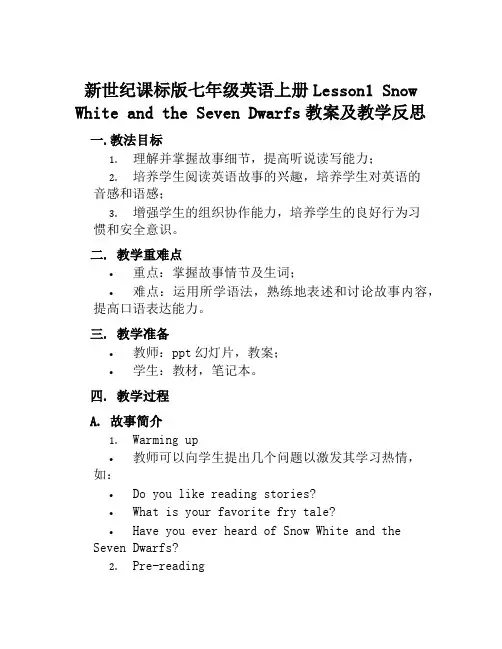
新世纪课标版七年级英语上册Lesson1 Snow White and the Seven Dwarfs教案及教学反思一.教法目标1.理解并掌握故事细节,提高听说读写能力;2.培养学生阅读英语故事的兴趣,培养学生对英语的音感和语感;3.增强学生的组织协作能力,培养学生的良好行为习惯和安全意识。
二. 教学重难点•重点:掌握故事情节及生词;•难点:运用所学语法,熟练地表述和讨论故事内容,提高口语表达能力。
三. 教学准备•教师:ppt幻灯片,教案;•学生:教材,笔记本。
四. 教学过程A. 故事简介1.Warming up•教师可以向学生提出几个问题以激发其学习热情,如:•Do you like reading stories?•What is your favorite fry tale?•Have you ever heard of Snow White and the Seven Dwarfs?2.Pre-reading•教师进行预读故事,介绍主要角色,强化生词,练习发音,有助于提高学生的语感。
3.While-reading•教师逐段讲解故事,同时辅以图片或轻松的活动,如:•Ask and answer questions;•Act out the story;•Picture matching;•Listening practice.4.Post-reading•教师可以帮助学生总结故事情节,复述细节,让学生参与讨论,以加深对故事的印象。
B. 生词解析•教师在此环节可以逐一解释生词,并配合相关图画和例句进行讲解,帮助学生掌握生词的意思和用法。
C. 语法讲解•通过故事内容梳理出其中的重要语法点,并逐一进行讲解,并让学生进行相关练习,加深其印象。
D. 总结反思•整理本节课所学内容,让学生口头述说所学到的知识点,督促学生定期复习,提高学生记忆效果。
五. 教学反思•教师在本节课的教学过程中,通过结合故事内容和各种互动活动,让学生的学习充满了趣味性,增强了学生学习英语的兴趣,一定程度上增加了学生学习英语的积极性。
Unit One (Reading and Speaking) 高中间谍2001年时,杰里米·艾弗森还是美国加州帕洛阿尔托市斯坦福大学的一名毕业班学生。
他胸怀大志却感到些许无聊,于是他便向校报《斯坦福日报》的编辑提出了一个想法。
他想要去当地的一所公立高中上两周的学,然后写一篇关于高中生活的文章。
这一想法无疾而终,因为该报拒绝帮助他进行这一欺骗行为,但是艾弗森一直没有放弃这一念头。
在2004年之前,他一直在向多家纽约大出版社建议出版一本关于暗中假扮高中生的非小说类图书。
他指出25年前卡梅伦•克罗为了他的电影《开放的美国学府》也做过同样的事情。
艾弗森想要了解年轻一代人的想法。
在没有证据证明学校会允许一位24岁的成人入学的情况下,没有出版社愿意签下这个项目的合同。
艾弗森身穿西装,带着装满文字材料和图表的文件夹,拜访了一位又一位校长,设法使他们相信他的计划具有社会价值。
三十所学校拒绝了他,最后终于有一所学校答应下来。
他用杰里米•休斯的名字入学,并在他随后所著的《高中秘事:一名学生间谍的秘密》(阿特里亚出版社)一书中称该校为米拉多高中。
让一名24岁的成年人偷偷潜入一群青少年中很容易带来许多麻烦。
假如他把啤酒递给一名学生,他会因此而背上向未成年人提供含酒精饮料的罪名。
假如他亲吻一名年轻的学生,他就有可能会受到性侵犯的指控。
艾弗森遵从着两条守则:不从事任何非法活动;不与任何学生有亲密的肢体接触。
一旦他的报告出版,他还必须要小心保护学生们不引起关注。
在他的书中,他更换了姓名并更改了细节,以此来掩盖学校和学生的身份。
然而,加州克莱蒙特高中的学生记者们认出了“米拉多”就是他们学校。
艾弗森在克莱蒙特高中的一个同学(现在已成为他的朋友)得知这一秘密行动时吃了一惊,但还是接受了。
“我当时只以为他又是一个早熟的少年。
”但是并非所有人都是这么通情达理。
学校接纳艾弗森并让他为了个人赢利而将该项目写作成书,家长和老师们对此感到震惊。
Unit4 Lesson1 Snow White and the Seven Dwarfs知识点归纳
(一)词汇
1. snow n.&v.雪;下雪
snow hard/heavily 雪下得很大
a heavy snow 一场大雪
snowy adj.下雪的
eg:①It seldom snows in Shanghai in winter.上海冬天很少下雪。
②It will be snowy tomorrow.明天将下雪。
2. dwarf n.矮子复数dwarfs/dwarves
scarf n.围巾复数scarfs/scarves
3. magic
(1)n.魔术;戏法
eg: She is good at magic.她擅长魔术。
(2)adj.有魔力的,魔术的;绝妙的
eg: a magic stick 一根魔法棒
magic words 咒语
We had a magic time yesterday.昨天我们拥有了绝妙的时光。
magician n.魔术师
music musician音乐家
eg: Liu Qian is one of the most famous magicians in China.
刘谦是中国最著名的魔术师之一。
4. in the mirror在镜子里
eg: We can see ourselves in the mirror.我们可以在镜子里看到我们自己。
5. die v.死亡,死(died,dying)
dead adj.死的
dying adj.将死的,垂死的
death n.死亡
eg:①My grandpa died ten years ago.我的祖父十年前去世的。
②The death of the dog made him very sad.小狗的死亡是他很难过。
③They sent the dying man to the hospital.他们把垂死的男人送去了医院。
6. huntsman n.猎人复数huntsmen (hunter)
hunt v.打猎
go hunting 去打猎
7. instead adv.反而,却(用于句首或句末)
eg: He doesn't like basketball. Instead, he likes football.他不喜欢篮球,却喜欢足球。
instead of 代替,而不是
eg:①I will go shopping instead of staying at home.我将去购物,而不是待在家里。
②Mary attended the meeting instead of me.玛丽代替我参加了会议。
8.alone adv.单独地
adj.单独的(只做表语)
eg:①The old man lives alone.那个老人独居。
②I was alone at home yesterday.昨天我独自在家。
9. bored adj.无聊的
boring adj.枯燥的,乏味的
eg:①I feel bored. I want to go out for a walk.我感觉很无聊。
我想出去散散步。
②The film is boring.这部电影很乏味。
10. finish doing sth. 完成某事
eg: He has finished cleaning his room.他已经完成了打扫自己的房间。
11.at once立刻,马上
= in no time = right now = right away = immediately
eg: When the teacher walked into the classroom,the students stopped talking at once.
当老师走进教室的时候,学生们立刻停止了说话。
12. prince n.王子
princess n.公主
13. happen to do sth.碰巧做某事
eg: I happened to meet my friend on my way home.
我在回家路上碰巧遇见我的朋友。
sth. happen to sb.某事发生在某人身上
eg: A: What's happened to you?
B:I've lost my way.
14. such adj.&adv.如此(的),这样(的);那么
eg:① I've never seen such an interesting film before.
我以前从没看过这么有趣的电影。
② He is such a good student.他是如此好的一个学生。
15. decide v.决定
decision n.决定,决心
decide to do sth.决定做某事
make a decision做决定
eg: He has decided to study harder.他已经决定要更努力地学习。
(二)语言点
1. tell sb. to do sth.否tell sb. not to do sth.
作宾补
ask sb. to do sth.
let/make have sb. to sth.
※不定式的否定在不定式前加"not"
eg:①The librarian told us not to talk in the library.
图书管理员叫我们不要在图书馆里说话。
②He asked me to help him with his English.他叫我帮助他的英语。
2. take sb. to sp.把某人带去某地
eg:①They took the dying man to the hospital.他们把垂死的男人带去了医院。
②My parents take me to the park every month.我的父母每个月都会带我去公园。
3. The kind man didn't kill her. Instead, he killed a bear.
The kind man killed a bear instead of her.
killing her.
4. carry & take & bring
携带拿走带来
eg:①Y ou mustn't take the magazines out of the reading room.
你不能把杂志带出阅览室。
②Please bring your books here tomorrow.请明天把你的书带到这儿来。
③The bus can carry 50 passengers.这部公交车可以携带50名乘客。
5. walk on and on不停地走
※跟持续性动词连用
eg: talk on and on 不停地说
6. little
(1)小的
(2)少的,几乎没有
eg:①There are little cats in the box, aren't there?有只小猫在箱子里,是吗?
②There is little bread in the fridge, is there?冰箱里几乎没有面包,是吗?
7. find the room clean and tidy
find +宾语+形容词作宾补
keep
eg:①find the room open发现房间的是开着的
②keep the room lean and tidy保持房间干净整洁
8. one after another = one by one一个接着一个
9. from then on 从那时起(用于一般过去时)
from now on 从现在起(用于一般将来时)
eg:①From then on, he began to learn English.从那时起,他开始学习英语。
②From now on, I will study English harder.从现在起,我要更努力地学习英语。
10. wake up 醒来
wake sb. up 唤醒某人
eg:①I woke up at 6 this morning.今天早上我在6点醒来。
②Mother woke me up at 6 this morning.妈妈今天早上6点把我唤醒了。
(三)课后补充
1. poisonous adj.有毒的
poison n.毒药,毒物(不可数)
eg: We need some poison to kill the mice.我们需要些毒药去杀死老鼠。
2. have a bite of sth. 咬一口
3. such a beautiful girl = so beautiful a girl
eg:①I have never seen such a wonderful film before.
②She has never met such a kind man before.。